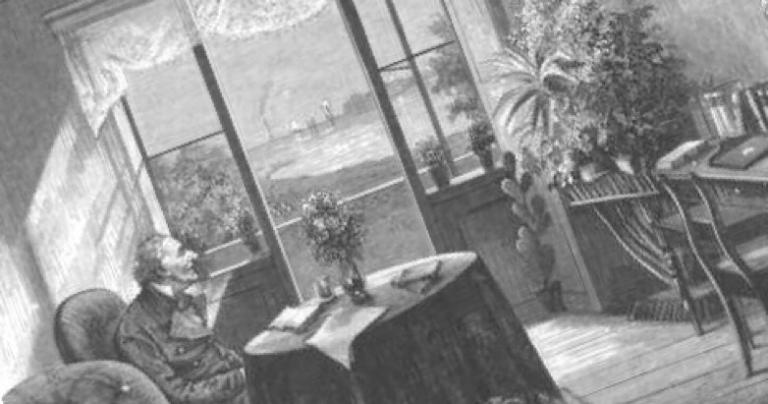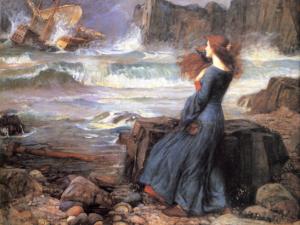 A home is to HGTV as a lady-wife is to a photoshop of a woman. The first is an ideal to which one might aspire, the second is a sales pitch for a product to consume.
A home is to HGTV as a lady-wife is to a photoshop of a woman. The first is an ideal to which one might aspire, the second is a sales pitch for a product to consume.
Making people a product is a great way to be miserable and a bad person. Kant built an ethics on the idea that people are ends, not means to ends. Tolstoy supported a similar idea creating stories, a virtual reality training program for virtue. A powerful novella The Death of Ivan Ilych is Tolstoy training the reader in the virtue opposed to the commodification of people: love.
Karen Swallow Prior (KSP) guides us on the virtue of love, Tolstoy’s story, and the implications of it all for us just now. Nobody should deny we need love: research and philosophy agree. Classical philosophers valued friendship as a love available to almost any human:
Aristotle says friendship “is an absolute necessity in life.” No one “would choose to live without friends, even if he had all the other goods” that life offers.
Scientific research suggests the necessity of love to humans:
Harvard Medical School’s famous Grant Study, which followed the lives of hundreds of men for seventy-five years, concluded that the most significant factor in life satisfaction is warm and loving relationships throughout one’s life. The study’s director summarized the findings this way: “Happiness is love. Full stop.”
The tricksy salesman knows love sells, because love is so important. He also knows that in English:
We have essentially one word to cover a wide variety of loves. We love our children; we love our dogs; we love mint-chip ice cream. . .
We can buy mint-chip ice cream and so if we are KSP, be as happy as mint-chip ice cream can make a person. (As for me and my house, we prefer that our toothpaste taste like mint and our ice cream taste not at all like toothpaste.) You can buy this love at any HEB. If you can buy love, will the right product make him or her fall in love with you? Conflating meanings is what the disreputable salesman does best.
Death of the Tricksy Salesman: Clarifying Terms
KSP breaks apart the many ways a Christian might say the word “love” using C.S. Lewis Four Loves*:
In his book The Four Loves, C. S. Lewis famously explored four types of love, each associated with words from the Greek language: empathy (storge), friendship (philia), desire (eros), and the highest form of love (agape).
She defines agape:
Agape is sacrificial and self-giving love, and has come to be associated with godly love because it reflects the “triune God who is a communion of persons in self-giving love [who] created all things out of love. All persons are created to be in union with God in ultimate happiness.”
This kind of love, charity, is a gift of God. We love God and so are able to love our enemies.
And here critics of Christian faith see a tension with the earlier classical ideas of virtue. How can we be commanded to be self-sacrificial and still just? Didn’t KSP herself tell us that we are to be moderate, not zealots? Isn’t the love, even of enemies, a recipe for self-hatred?
This might be true if love were merely a command. When we are told to do things from love, this is not to do a mere duty. If we do not love, are not motivated by love, then our self-sacrifice might be a manipulative technique or even self-hatred. Instead, we can pray and so receive a desire to “do good to those who despitefully use” us.
Until we are motivated by love, the classical virtues guide us. Love gives us new motivations and (often) new insights into possibilities.
We can also tell when we are motivated by a Godward love, because this love leaves room for complex responses and does as little harm as possible. Justice might insist we stop a person breaking into homes so his injustice to himself and others does not continue. Justice might end at this, but love will insist that this restraint be done as much as possible in a redemptive manner.
Godward love does not always demand self-sacrifice for others. God delights in our delight, after all. Sometimes, however, we delight in seeing our friend get the mint-chip ice cream she so plainly wishes, even if that means not gettng what we wish. Love does not resent or even advertise this choice, but delights in the gift.
Ideally, if the world were as it should be, our friends would also love Godward and so look to delight us. We would live in a virtuous circle of loving gifts given from happy hearts. As we all spiraled Godward, virtue would increase with joy.
Cupidity: Don’t Confuse Cupidity with Charity
Against this life is the way most of us live this side of Paradise. We confuse convention with morality and cupidity with charity. KSP presents Tolstoy’s character, Ivan Ilych, as consumed with false love, cupidity:
Within ancient Christian tradition, cupidity was associated with lust and ambition, the counterpart of the virtue of charity or godly love.
Cupidity picks any object other than God, most often some petty desires (a job at 5,000 rubles!) and makes that desire the end of our life. Since we have eternity in our hearts, no finite thing can long satisfy this desire. Tolstoy shows Ivan on his deathbed miserable through cupidity. He will die because he fell and hurt himself adjusting some drapes.
KSP suggests Ivan has minimized his pain and suffering all his life through “decorum.” This seems right to me and reminded me that decorum is false justice. Decorum takes the convention of a city and assumes we live in the City of God and not a city of man. Decorum combined with cupidity leads to the futility of middle-class morality.
Why futile? Consuming just the right products has replaced moderation. Customs are cheap faith. Fitting in with the crowd is the vice that replaces prudence. Social climbing will run risks, ersatz courage. Ignoring death and pretending to immortality is the “hope” of an Ivan Ilych.
He has made a hell of a life:
The reader naturally feels pity for Ivan to have been surrounded by such people. But as the story goes on, we learn that Ivan structured his life in such a way as to keep people at a distance both at work and at home.
A man can cheat many thinks, but not death. Death comes and brings Ivan one last chance at genuine love, because cupidity is nothing in the face of death. Only charity, Godward love, has the strength to conquer death by transforming it to birth.
Marriage and Charity
All other loves, friendship empathy, and desire are compatible with charity. God gave us lesser loves to point to the greater love. Cupidity, however, destroys all the loves. Ivan has no friends and no empathy for other people.
Perhaps saddest of all, he has a loveless marriage and terrible family life. The very “safeness” of Ivan’s life, his love of ease and comfort, mean that he can never experience the highs and lows of marital love. KSP says of Ivan:
He had dalliances in his youth, we learn, but as with all his accomplishments, the proverbial sowing of Ivan’s wild oats was rather like the fulfillment of some proper duty more than arising from some deep, if illicit, desire: “all done with clean hands, in clean linen, with French phrases, and above all among people of the best society and consequently with the approval of people of rank.”
His marriage has some love and his son shows genuine affection toward him, but there is no grand passion. Cupidity kills passion, because passion always may turn Godward. A man will sacrifice much for love and there is danger for the Devil in even a moment of unselfishness. Being unselfish is not charity, but even a momentary absence of cupidity may allow for a longing for more.
The need for more is what might turn a person Godward. Boredom is the friend of devils, not passion.
Ah, Tolstoy
I struggle with Tolstoy.
He lived a life at odds with his ideas. We all do that (Lord have mercy on me a sinner!), but Tolstoy kept going. He was a difficult husband.
In Ivan Ilych he paints the servant Gerasim as the one who “gets it.” I would have an easier time with this stereotype of Russian literature (our help is in the peasants!) if Tolstoy had not been such a wretch to workers.
And yet he writes like a god and aspires to God. He means it and yet . . . And yet he treated his wife so badly. He was a genius who could mock the cupidity of the mediocre while developing the cupidity of the brilliant: he loved his truth so much he lost the good of it.
Tolstoy himself was Christian without being (unfashionably) Orthodox. He was revolutionary without (quite) getting in trouble. Tolstoy was the very model of a Tsarist intellectual guru: edgy without Siberia.
None of that denies the truth in his writings.
Yet.
Gerasim and Death
He may be a stereotype, the noble peasant, but Garasim is a good character. He is compassionate and almost alone tells the truth. He knows death is coming to Ivan and has pity.
Gerasim is full of divine charity:
In the midst of the most universal, most humbling, most unpleasant, and most human situation, Ivan finds the charity that has been absent most of his life. Only Gerasim faces the truth about Ivan’s condition. Thus he is the only one capable of offering charity—love that seeks the good of the other in the knowledge that what is good is also true.
Gerasim is well named: ‘respectable.’ He is ministering to man who tried to make respectability his god and ended up only conventional. Gerasim does not care about respectability at all, but he is so. He can help Ivan die, because he knows the truth and does not hide from it: he will die as well.
While Geraism has charity, he will still die. There is no cure to death, no wishing death away. Instead, Gerasim is ready to die. Charity goes through death to life. Death cannot be avoided, but:
Surely, by the end of his life, Ivan has learned this truth. Without love, Wesley says, “nothing can make death comfortable.”
Charity never fails. Ivan dies having fallen for draperies. We can live if we fall in love.
Thanks KSP.
Buy the book.
————————————-
This will be a twelve part series: Introduction, Prudence, Temperance, Justice, Courage, Faith, Hope, Love,
*I am skeptical that Classical Greek uses the terms that Lewis describes as consistently as Lewis does. Two things remain true, however. Lewis knew more Greek than I will ever know and this is not central to KSP’ point. Lewis gives a good way to
















